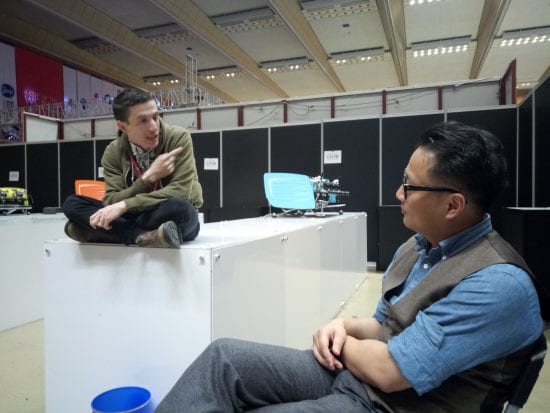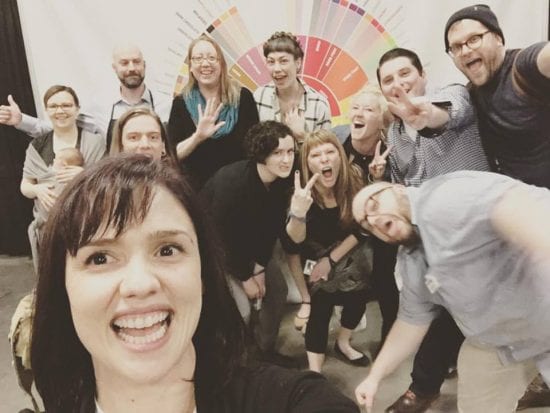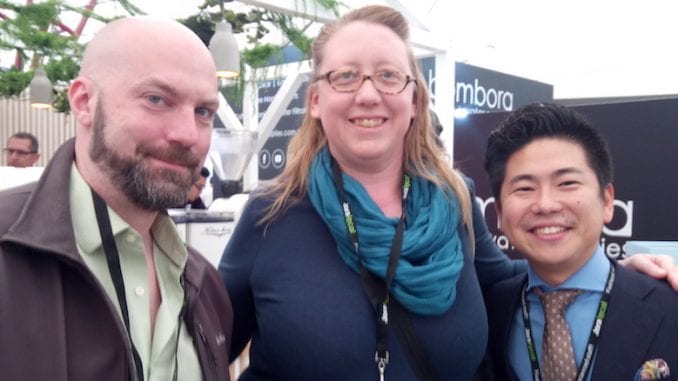
We get some tips, tricks, and insights before the U.S. CoffeeChamps with KC coffee pro and competition coach Holly Bastin!
BY CHRIS RYAN
BARISTA MAGAZINE ONLINE
Photos courtesy of Holly Bastin
As we get closer to the United States Coffee Championships in Kansas City, Mo., we turn our attention to the KC community, coffee scene, and the folks who built it. We’re spending this entire week talking to folks who made the Kansas City coffee scene what it is, and providing insights and stories that go beyond the competition. Through the end of the competition, we’re dedicating our coverage to the City of Fountains; today we have a conversation with Holly Bastin, veteran barista competitor, judge, and coach, for some insight about coffee competition.
In 2002, Holly Bastin took part in her first barista competition. In the 15+ years since, barista competitions have never been far from her life, as she has gone from competitor to judge to competition coach. In this last role, Holly has seen considerable success, coaching her longtime friend and collaborator Pete Licata in his 2013 World Barista Championship win, working with Cole McBride and T. Ben Fischer for the 2018 U.S. Barista Championship where they placed first and second, respectively, and training many other barista competitors for national and international stages.
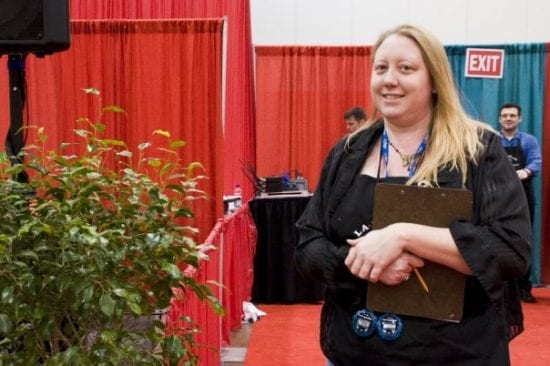
A native of Kansas City, Holly is very excited for the national specialty-coffee community to descend on Kansas City for this weekend’s U.S. Coffee Championships. We talked to her about how she approaches coaching barista competitors, some tips for baristas taking part in this weekend’s event, and what it means to her for Kansas City to host U.S. CoffeeChamps.
Chris Ryan: You’ve been training barista competitors for around a decade; how do you stay current with trends and the competition’s rules and regulations when you aren’t competing or judging on a regular basis?
Holly Bastin: I think a lot of my insight comes more from historical experience and staying tuned into the evolution of these events. I first got involved as a competitor in 2002, which was before the competition had public rules and regulations. You literally just showed up and hoped you did whatever it was they were looking for. Back then, feedback was given about a month later in pretty vague terms.
I switched to judging in 2004-2005, when the first version of the modern seven-judge format was first introduced. I was in the right place at the right time to learn the foundational materials and intention from those who were creating it. As a head judge in the U.S. from 2006-2010, I then became an interpreter and enforcer of the rules, giving me greater responsibility to know them inside and out. This is the foundational understanding I bring to the table.
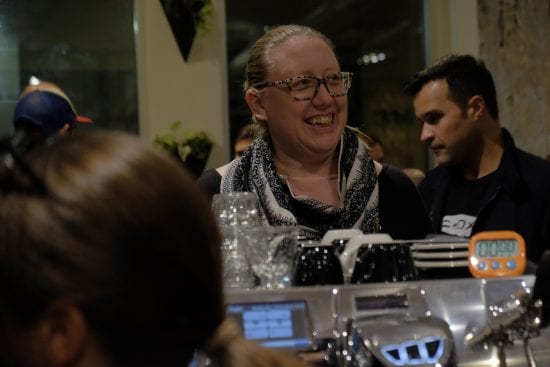
Keeping up with the constant, caffeinated evolution since retiring from judging is another story. One advantage these days is that we have the ability to contact the competition staff before heading to competitions and ask if ideas are within the spirit of the rules or not. The biggest help is the built-in feedback loop. I have come to rely a lot on the score sheets themselves and, most importantly, the debriefing with the judges at the competition. This is how any competitor can get the most up-to-date insights into how things are being scored and interpreted. And, of course, being at world-level events gives me a big-picture perspective on the trends as they hit the scene. Watching a world final is a bit like looking into a crystal ball of specialty coffee’s future!
What is usually your role as a coach/trainer in helping a barista competitor reach their full potential? Do you evaluate the routine they already have and help them make it better?
Mentorship is not a solo act or hierarchy, but a partnership. The strongest foundation is trust, engaging in a respectful, open dialogue. As many know, it’s very easy to get lost in the weeds throughout a season, and accountability is key to keep everything on track. It’s a journey, not a destination.
As far as my training activities go, the details depend on how much face-to-face time we will get, but the methodology is the same. I start by meeting the person wherever they are in their own process, which is mostly a lot of listening and questioning to identify the work their idea will require. A lot of the activities end up being the same from person to person, but no two competitors have the same process or motivations. There is a lot of variety in how it can play out.
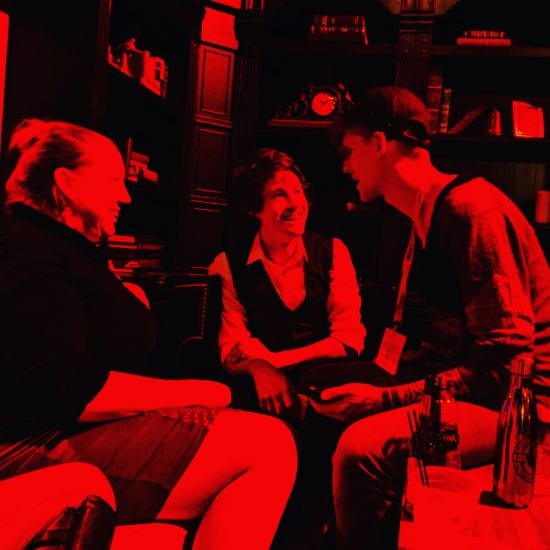
Digging into the nitty-gritty, my number-one question to each of them is, “Why are you doing this?” Purpose is essential to success—it informs the decisions throughout your process. Competition is no joke; it’s hard work, especially if you want to win. Beginning with the end in mind helps you find your path again when you’ve gotten off on the inevitable rabbit trails, keeping them from turning into full-on black holes.
Can you offer any last-minute general tips for competitors taking the stage this weekend in Kansas City? Any advice you can offer, potentially just from a mindset perspective before they go out there?
Here are some practical tips first:
Eat and drink water. You’re dialing in espresso and will have some degree of nerves. You may not feel hungry, but having stable blood sugar makes for a much better decision-making and emotional vibe.
Create detailed organizational tools, such as checklists for your cart, a timed-out agenda for practice and prep times, etc. Visualize your plan.
Carry on your more precious items, especially your coffee. Then you will know exactly how they’re doing and where they’ve been.
Be prepared to problem solve. Know that something won’t go exactly to plan and embrace adaptability. In that way, it’s no different than unexpectedly getting a bus load of customers during a bar shift—ain’t nothing to it but to do it!
On mindset, when it’s game time, be focused but stay open. It’s very easy to get caught up in the tunnel vision of preparation, but the competition itself is a tremendous opportunity to find connection with your colleagues and peers. Coffee is people, first and foremost, but people who actually understand coffee. Your back room is a collection of the most creative and scientific emerging minds in coffee to date. It’s important to remember that there is a difference of mentality between competing against someone and competing with them—exclusive versus inclusive. Share your ideas, and let folks taste your coffees! I can say from experience, years down the road, the relationships I’ve forged in back rooms during these events have turned into career-long relationships and creative collaborations outside of competition. I encourage you to enjoy and appreciate that same opportunity.
At the end of the day, trust yourself. You’ve already qualified and are already in the top 37 baristas in the entire United States. When in doubt, give yourself credit for what it took to get where you are, and trust that whatever you need is already in there. You just have to tune in and tap into it.
What does it mean to you for Kansas City to host the U.S. Coffee Championships?
There was a time, as little as even 10 years ago, when it seemed impossible that Kansas City would be considered to host something as culturally significant as the United States Coffee Championships. And here we are—it’s all happening! We’re so ready for it, not just as a coffee community but as a city. We’ve even set up an Instagram account to make it easy to ask questions and know what’s going on: @kc.coffeecow.
Prepare yourself for some Midwestern hospitality—we look forward to sharing our home, food, and sense of coffee family with the whole U.S. coffee crew!

